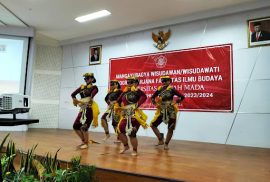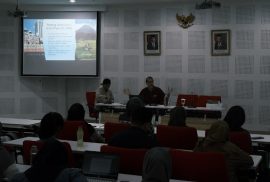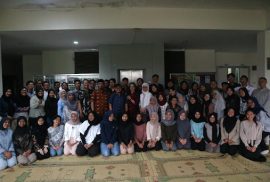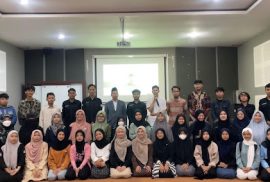SDGs 4: Quality Education | SDGs 17: Partnerships for the Goals
On Wednesday, (05/22/2024), the 7th floor Soegondo Auditorium was full of gratitude and happiness. The smiles of the graduates who have successfully completed their studies and achieved satisfactory results. The submission of graduation documents in the form of diplomas and academic transcripts is something to look forward to because it marks the legitimacy of graduating students and officially holds a degree according to the study program they each take.
In the event that was full of wisdom, four students of the Javanese Language, Literature, and Culture Study Program, Faculty of Cultural Sciences, UGM, entertained the graduates and the audience with Angguk Dance. They are Novalia Hidayatus Solihah, Nanda Fitri Riyantika, Wening Hidayati, and Audrey Gizella. The Angguk dance performed by the four female students succeeded in bringing smiles and admiration from the graduates and guests. “Alhamdulillah, the Angguk Dance performance went well. Although there are shortcomings, we feel satisfied and proud to be able to entertain the audience at the Mangayubagya event for graduates of FIB UGM,” explained Wening Hidayati in an interview (05/24/2024).
Quoting from disbud.kulonprogokab.go.id (2020, August 5), Angguk Dance is a traditional art originating from Kulon Progo Regency. It is believed that this art emerged around 1900, right when the Dutch soldiers and officers occupied the area of Purworejo Regency. The soldiers’ dancing and singing became the forerunner of the Angguk Dance that emerged in Kokap Sub-district, an area directly adjacent to Purworejo. Initially, Angguk was danced by men. In 1991, it was first danced by women in Pripih Hamlet, Hargomulyo, Kokap.
The Angguk Dance performance in the Mangayubagya event for graduates of the Faculty of Cultural Sciences, UGM, was successfully run with great fanfare. This performance is also a concrete manifestation of the students of the Javanese Language, Literature, and Culture Study Program in nguri-uri ‘preserving’ and ngurip-urip’reviving and enlivening’ the culture of the archipelago, especially Javanese culture. The preservation of national identity can be carried out with synergy from various parties so that it can have a broad impact on society and the nation.
References:
Disbud.kulonprogokab,go,id. (2020, August 05). Tari Angguk Kesenian Tradisional Kulon Progo. Accessed on May 24, 2024, from https://disbud.kulonprogokab.go.id/detil/356/tari-angguk-kesenian-tradisional-kulon-progo
Author: Haryo Untoro






